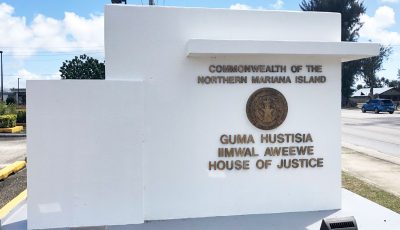Supreme Court upholds assault and battery conviction
On Dec. 29, 2015, the Supreme Court issued Commonwealth v. Fitial, 2015 MP 15, affirming Herman S. Fitial’s conviction for assault and battery. On appeal, Fitial argued there was insufficient evidence supporting his conviction because his uncorroborated confession could not serve as the basis for a conviction under the doctrine of corpus delicti.
On the evening of Jan. 1, 2013, Fitial went to New Chang Ming Market with Felix Kileleman, where they encountered Jefferson Keju. Fitial and Kileleman began arguing with Keju and then chased him toward a nearby gas station. At some point, Keju swung at Fitial, missed, and Fitial allegedly punched Keju on the face. Fitial and Kileleman then chased Keju into the street, where he was struck by two cars. Keju died as a result of his injuries. The next day, Fitial was identified from surveillance video and questioned by detectives Jeffrey Olopai and Elias Q. Saralu. In two separate interviews, Fitial admitted to meeting Keju at the New Chang Ming Market, arguing with him, punching him, and chasing him to the gas station before Keju ran into the street and was struck by a car.
Fitial was charged with involuntary manslaughter and assault and battery. At trial, several witnesses testified to having seen different parts of the encounter, including the argument near New Chang Ming Market, the chase toward the gas station, and some men scuffling with one another. None of the witnesses directly saw anyone strike or punch anyone else. An autopsy showed Keju had wounds consistent with having been punched. The trial court acquitted Fitial on the involuntary manslaughter count but convicted him of assault and battery.
The Supreme Court held there was sufficient evidence supporting Fitial’s conviction because there was adequate evidence corroborating his confession under the Commonwealth’s corpus delicti rule. First, the high court concluded there was sufficient evidence demonstrating that the “criminal conduct at the core of the offense” occurred. In particular, there was witness testimony indicating Fitial encountered Keju at the New Chang Ming Market, chased him, and scuffled with him, and that Keju suffered wounds consistent with having been punched. Second, the high court determined there was sufficient evidence that Fitial’s confession was trustworthy because his confession was substantially corroborated and was voluntarily given twice after Fitial was read his Miranda rights. Because Fitial’s confession was sufficiently corroborated under the corpus delicti rule, the high court affirmed the trial court’s decision.
The high court’s full opinion is available at http://www.cnmilaw.org/supreme15.html. (NMI Judiciary)


























